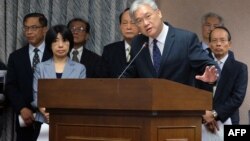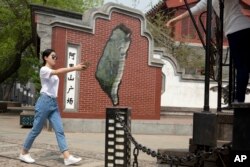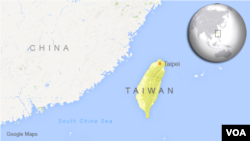A war of words between China and Taiwan over how the two sides should handle alleged perpetrators of telecom fraud targeting Chinese citizens is increasingly turning political.
But more than politics, analysts say the case highlights gaping differences between the two sides’ legal systems, and the importance and need for collaboration in fighting such fraud.
Forcible deportation
The battle began last week when authorities in Kenya allowed Chinese authorities to forcibly deport more than 40 Taiwan citizens back to China. The Taiwanese had been acquitted in Kenya of undertaking telecom-related business without a license and were supposed to be returned home, but instead were shipped off to China.
Authorities in Beijing have said little about how they would be prosecuted and refused to respond to requests from Taiwan to see the alleged fraud suspects.
Already, two alleged fraud suspects, surnamed Chien and Liu, have been either quoted or paraded on state-media and television in what appeared to be a forced confession even before they were indicted or put on trial.
Fraud suspects released
However, when another group of fraud suspects were nabbed in Malaysia, Taiwan managed to have them returned to the island. After they were returned to Taipei, the suspects were released for lack of evidence, further enraging authorities in China.
A top Communist party-backed newspaper, the Global Times, reacted angrily to Malaysia’s decision to return the Taiwanese fraud suspects to Taipei.
In the sharply worded opinion piece, The Global Times complained about how the suspects were released just hours after their return because of a lack of evidence, saying the authorities’ actions had disgraced Taiwan’s media and rule of law.
“A judiciary case, which should be fact-oriented, is turned into a political event across the Straits. The suspects even applauded Taiwan for its ‘human rights’ after being released,” the editorial said.
Taiwan harboring criminals
Chinese victims themselves further accused Taiwan of harboring criminals.
“I heard from news that those Taiwanese fraudsters have been arrested, which has slightly eased my mind. But now, we were told that some, who were deported back to Taiwan, walked away free,” a victim’s daughter told state media CCTV.
“Taiwan is harboring and conniving the criminals. [Under such circumstances,] there will be more victims falling for their scams,” she added.
Another 81-year-old victim agreed.
“They broke the law. Why were they released? This shouldn’t be tolerated. This is injustice,” the victim, surnamed Wu, told CCTV.
Featuring confessions of both the victims and the suspects, the lengthy TV report, however, gave no evidence or connection between the cases and those arrested.
The suspect surnamed Liu admitted he worked on a 2-3 percent commission in addition to a monthly pay of under $1,000. Liu’s mother had testified and pleaded innocence for her son in Taiwan’s legislature.
Chinese state media have said at least some of the fraud suspects allegedly called Chinese citizens and pretended to be prosecutors demanding payment for crimes or infractions, with the threat of jail for those who didn't pay up. The victims were allegedly told to wire money to an account to clear their name.
Differences in law interpretation
In Taiwan, many have called the forced deportation to mainland China of more than 40 Taiwanese an "illegal abduction." The Global Times editorial argued, however, the release of the suspects shows the ugly side of Taiwan politics.
Chiu Tai-san, designated minister of justice under the incoming DPP government, said he strongly disagrees with that assessment.
“The incident does highlight gaping differences about the rule of law and the protection of perpetrators’ rights between Taiwan and China,” Chiu said.
For example, Taiwan honors the presumption of innocence before anyone is found guilty and lawyers should be present during the interrogation of perpetrators - due processes and practices - which China often ignores, he said.
“All in all, in any case, no countries should or will give up its jurisdiction over prosecuting its nationals, who break the law either at home or abroad. Otherwise, it will create lots of discrepancy for the measurement of penalties on its people,” he added.
Telephone scams growing
Last November, China launched a campaign to crack down on telecom fraud, something that state-media have said is a fast-growing crime. According to official estimates, the telephone scams have already resulted in more than $1.5 billion in losses in recent years.
Without giving any specific details, a February report in the English language China Daily said China had arrested more than 9,400 suspects since the campaign began. Among those suspects, the report said, 950 were arrested overseas with the help of authorities in Cambodia, Thailand, Laos and Malaysia.
And that’s why collaboration is so important, Chiu said.
“The closer the cooperation between Taiwan and China, the bigger the chance to combat the [cross-border] crime and allow the justice to prevail while striking a win-win for both governments,” Chiu said, urging both sides to refrain from putting up more shows to politicize the controversy.









